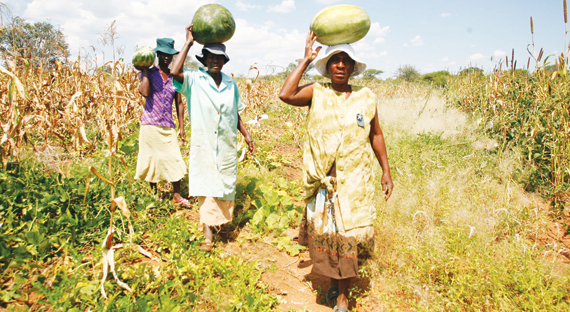
HEAVY rains that pounded the drought-prone Matabeleland South province have not translated into joy for some villagers who were looking forward to a decent harvest after years of surviving on food handouts.
NQOBANI NDLOVU STAFF REPORTER
Crop farming had almost been abandoned in the province due to the perennial drought, but heavy downpours that lashed most parts of the country from December 2013 until February this year had raised a glimmer of hope that most households would produce enough in their fields to feed themselves.
For the first time in years, their fields were lush green with healthy maize crops and prospects of good harvests seemed a reality.
Elitsha Ncube (65) from Village 2 in Maphisa had anticipated a good harvest, but has been left a disappointed man.
Ncube thought that his days of surviving on government and non-governmental organisation food handouts were over as his crops were growing steadily in a healthy state.
A good harvest looked promising until a swarm of quelea birds and grasshoppers invaded the area and ravaged all crops.
Quelea birds are ranked by the United Nations Food and Agriculture Organisation (FAO) as the most destructive and abundant birds in the world.
- Chamisa under fire over US$120K donation
- Mavhunga puts DeMbare into Chibuku quarterfinals
- Pension funds bet on Cabora Bassa oilfields
- Councils defy govt fire tender directive
Keep Reading
According to FAO, the birds devour about $70 million of crops worldwide per annum.
The birds feed on grass, seeds and grain as soon as the sun comes up. Up to 30 million birds may make a flock and they also feed in the evening.
“It’s going to be the same old story of food shortages and queueing for handouts again,” Ncube said while showing Southern Eye the destruction caused by the birds and grasshoppers in his fields.
Like other subsistence farmers, Ncube said he had no money to purchase pesticides, chemicals or dynamite to fight the grasshoppers or blow up the concentration of the quelea birds.
Ncube turned to an age old and time consuming traditional method of spending the whole day in the fields chasing the birds using a catapult or making noise to protect his fields.
“We make scarecrows and place them at strategic points in the field to scare the birds. We also use catapults, but it’s cumbersome and time consuming to go to the fields everyday looking for the grasshoppers at each and every maize crop to kill them,” Ncube said.
Grasshoppers also destroy pastures, gardens, cultivated crops and can totally strip trees of their leaves in a matter of hours.
They also prefer habitats with a variety of host plants, including both grasses, and as a result prefer cropland settings.
“These birds and grasshoppers have been our worst nightmare. This was going to be my first harvest in years because of the good rains but all is gone. We will soon be appealing for food aid,” Ncube added.
Khethiwe Tshabangu from Manuka village in Kafusi also sang from the same hymn book, but blamed the government for failing to deliver fertiliser to protect some planted crops from too much rain.
“We received fertiliser, but it was a bit too late. Maize crops suffered from drenching and now we also face the menacing quelea birds and grasshoppers,” said Tshabangu.
“They have destroyed so much of my crops that I think I would only be able to harvest maybe two 50kg bags of maize which cannot feed my family for long.”
Mduduzi Dube, another villager from Manuka, told Southern Eye that he also spent most of his time at the fields trying to chase away the quelea birds and destructive grasshoppers.
“There is no better way of controlling the quelea birds and grasshoppers other than the use of pesticides and chemicals,” Donald Khumalo, the past president of the Zimbabwe Commercial Farmers Union said.
Khumalo indicated that subsistence farmers could also turn to the traditional farm methods to deal with the birds if they do not have money for pesticides.
“In the past, planting dates used to be synchronised. You will have one planting date unlike the case now where people plant as and when they plant.
“Synchronising the planting dates minimises the impact of the damage that these birds can cause in that it will be green all over and the birds will be spread all over and not descend on one field and cause massive damage,” he said.
Matabeleland South has over the years faced food shortages owing to the poor rains and experts have long called for irrigation schemes to be effectively established to alleviate food shortages.
“Irrigation is key to sustainable food security and government must align all irrigation schemes and provide all forms of support to guarantee certain grain inflows to the market,” Khumalo said.
“We also need to define a clear food strategy and it must incorporate water conservation measures like drip irrigation.”
In Gwanda district, villagers have turned to harvesting mopani worms (amacimbi) to at least hedge against the impact of food shortages as a result of the destruction caused by the quelea birds.
Tsepo Dube and her daughter Sharon Nare from Takaliawa village had camped in the bush near Shashe River on the border with Botswana for more than a week harvesting the mopani worms.
“I can pay school fees for my children and buy other necessities after harvesting and selling mopani worms,” she said.
Dube said it took her nearly two days to fill up a 50kg sack with mopani worms. She sells a 20l tin of mopani worms for $20.










